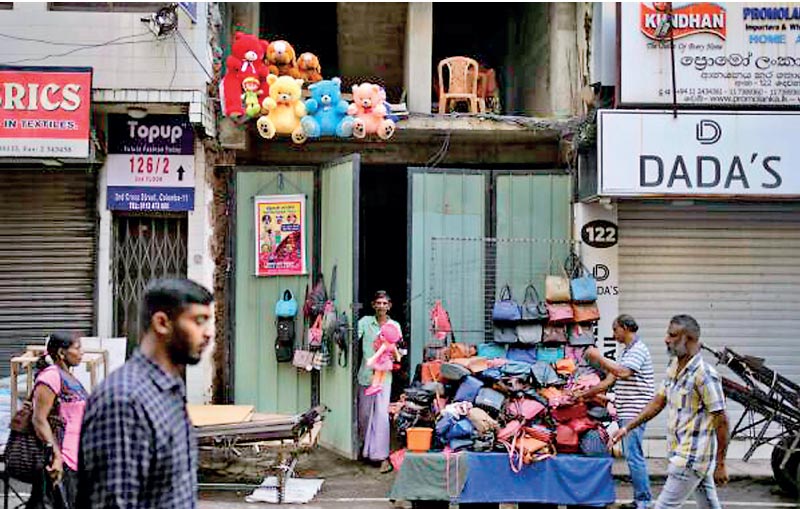Sunday Feb 15, 2026
Sunday Feb 15, 2026
Thursday, 21 December 2023 00:22 - - {{hitsCtrl.values.hits}}

Sri Lanka cannot afford another crisis of this magnitude and must transform its economy while making growth more inclusive
|
 Last month, I visited Sri Lanka for the first time and saw a nation at a crossroads, emerging from a deep crisis and determined to make a real effort to implement changes.
Last month, I visited Sri Lanka for the first time and saw a nation at a crossroads, emerging from a deep crisis and determined to make a real effort to implement changes.
What struck me the most was the resilience of the Sri Lankan people, from the strong and inspiring women leaders and entrepreneurs shattering stereotypes to the farmers who are investing their earnings from sustainable farming practices back into their communities while battling climate change or the doctors who are looking ahead by investing in preventive healthcare.
I also witnessed the strides Sri Lanka has made in stabilising the economy. Yet, much remains to be done to chart a better future for all Sri Lankans. While Sri Lanka has a unique opportunity to implement deep and permanent structural reforms that may be difficult under normal circumstances, the window of opportunity is narrowing. But Sri Lanka cannot afford another crisis of this magnitude and must transform its economy while making growth more inclusive.
I’ve been reflecting on the experience of countries that have successfully weathered an economic crisis and the lessons they hold for Sri Lanka. I see five main areas for concerted action.
First, maintain macroeconomic stability to support investment, trade, and growth. Sri Lanka is a highly indebted nation, with public debt far exceeding the size of the economy. It is critical to finalise external debt restructuring to restore debt sustainability and boost confidence. This needs to be complemented by fiscal consolidation, including mobilising more taxes, making better spending decisions, and improving the governance of public finances. This, in turn, can create the fiscal space to invest in people and infrastructure. This is possible. In the past, Sri Lanka’s tax revenue collection was close to 20% of GDP, compared to just 7.3% in 2022.
Second, protect the poor and vulnerable as the country emerges from the crisis. A lot has been done over the past 18 months to consolidate social assistance programs, expand coverage, enhance targeting and delivery, and improve governance and transparency. This includes the rollout of a new social welfare payment program, Aswesuma. Although there have been challenges with the implementation of the new beneficiary registry, the Government is working to ensure social protection helps the most vulnerable Sri Lankans during shocks. This includes women, whose unemployment rate is twice that of men, making them far more vulnerable to the impacts of crises. Beyond social assistance, women also need equal opportunities to join the workforce, which would boost economic growth and household incomes.
Third, generate jobs by creating conditions for investment and trade, incentivising exports, and integrating into global value chains. To encourage investors, Sri Lanka can take a page out of East Asia’s playbook by liberalising trade, eliminating import restrictions, and pursuing stronger regional and bilateral trade agreements. Our analysis shows that the country’s untapped export potential for merchandise is about $ 10 billion annually. Delivering on this could double exports, create more than 140,000 jobs, and help put the country back on a sustainable growth path. Sri Lanka can also increase private investment by restructuring state-owned enterprises and divesting from non-strategic ones. This will help foster competition, create more jobs, and drive improvements in service delivery.
Fourth, pursue energy and agricultural sector reforms to drive a resilient and inclusive recovery. The power sector has been marred by financial losses, blackouts, and opaque procurement processes. The current energy sector reforms – including the unbundling of the Ceylon Electricity Board and cost-recovery energy pricing – aim to address these issues and ensure energy security and affordability. At the same time, the shift toward renewable energy, energy efficiency, and regional power integration can reduce dependence on imported fossil fuels and lower energy costs. With respect to agriculture, I saw first-hand in Thirappane and Rajangana the strong contribution it makes to both livelihoods and exports. Yet, the sector suffers from low productivity and is highly vulnerable to climate change and natural disasters.
To modernise agriculture, Sri Lanka needs to adopt climate-smart technologies, as well as strengthen value chains, linkages between farmers and markets, and quality standards. For example, I visited a school in the North Central Province dedicated to climate-smart agriculture. The school, the first of its kind in South Asia, conducts training programs for farmers, 40% of whom are women. Such initiatives empowering farmers with knowledge and practical training should be scaled up. Taken together, these actions can boost agricultural output, rural incomes, and export competitiveness in a country where 80% of the population lives in rural areas.
Fifth, strengthen governance and address corruption to instil public confidence and improve service delivery. Sri Lanka has a complex and fragmented public sector, which faces challenges in accountability, coordination, performance, and transparency. To improve governance, Sri Lanka can modernise institutions, digitise procurement and service delivery, strengthen policy and planning processes, and enhance monitoring and evaluation systems. This will combat corruption and fraud, and foster a culture of integrity, openness, and participation.
While these five areas look promising on paper, coordination, capacity, and communication – the three “Cs” – will be critical for effective reform implementation. Closer coordination across Government – including the Ministry of Finance, Central Bank, Line Ministries, and Parliament – is paramount for the delivery of the reforms. Capacity strengthening is critical to drive the reform agenda and improve governance. Communication is the cornerstone of any successful reform process, as citizens need to understand what is being asked of them, key stakeholders need to be engaged, and a platform must be available to receive and address grievances. The World Bank and other development partners are working closely with the Government to ensure that these three Cs have the commitment and resources needed to succeed.
(The writer is the World Bank’s Managing Director of Operations, overseeing projects in 130+ countries focusing on poverty reduction, equitable growth, human development, and climate change, among other key priorities. Prior to this, she served as Vice President for Europe and Central Asia, leading the institution’s efforts to steer the region through a series of overlapping global shocks, including the COVID-19 pandemic and the World Bank’s support to Ukraine. An experienced leader with recognised expertise in sustainable infrastructure, she has a strong record of delivering impactful programs across sectors and regions, including Africa and the Middle East.)